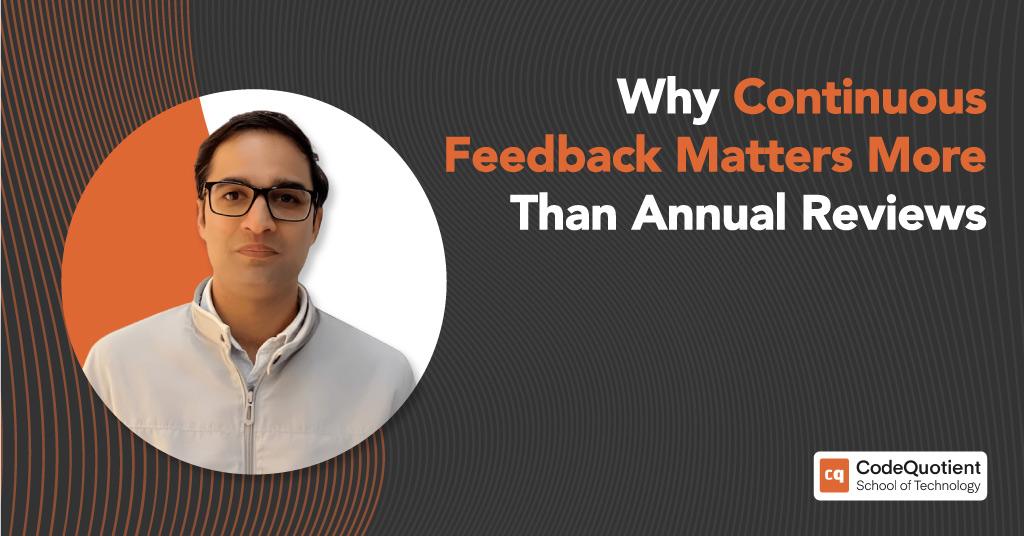Timing and frequency of employee reviews and appraisals greatly impact their performance. While annual reviews have been the norm in traditional enterprises, some prefer continuous feedback.
At CodeQuotient, we realised that continuous feedback is more impactful than just conducting annual reviews as it offers employees an opportunity to enhance their performance immediately.
Here are other reasons why, as the Founder and CEO of CodeQuotient, I believe continuous feedback and annual reviews are crucial to building sustained employee engagement.
9 Reasons Why Continuous Feedback Is More Important Than Annual Reviews
Following are some of the key benefits of following a continuous feedback mechanism:
1. Timely resolution of performance issues
When managers offer continuous feedback, employees understand the issues right at that moment and address them proactively.
This enables managers to identify problems early on and solve them in the bud, which could prevent them from escalating into significant problems impacting business productivity.
2. More flexible and dynamic
While annual reviews are a one-time, structured process, continuous feedback is more dynamic and flexible.
This is more impactful in the fast-paced work environment that demands agility and dynamism to keep up with the evolving changes and industry trends.
3. Opportunity to course-correct immediately
Employees can gain access to actionable insights quickly and course-correct them continuously instead of waiting for a year to get feedback.
Continuous feedback offers a platform for conducting frequent checks of employees’ alignment with organisational goals. Employees can correct themselves without wasting their time on resources and activities that do not add any value in the long term.
4. Promotes learning and development
Continuous feedback helps employees identify their weaknesses and areas for improvement without having to wait for annual reviews. They can work on the feedback continuously and develop critical skills and capabilities.
5. Higher degree of personalisation
With a continuous feedback mechanism, managers can provide more tailored feedback based on the employee’s performance, weaknesses, and crucial areas of development. It is more effective and flexible than annual reviews.
6. Fosters a company-wide learning culture
Continuous feedback helps build a continuous learning culture in an organisation.
With timely feedback about performance, employees are motivated to learn from experiences and align themselves with their roles and responsibilities.
7. Strengthens goal and task alignment
When we implemented the continuous feedback method at CodeQuotient, tracking employees’ alignment with business goals was more straightforward.
As managers regularly discuss priorities with employees, there is more clarity regarding milestones and business goals. This helps spot deviations and quickly and easily put them back on track.
8. Promotes high employee engagement
Setting aside a specific time of the week to review challenges, exchange ideas, and engage in authentic conversations with employees drives greater engagement.
It helps identify gaps and cracks and fix them before they escalate. Employees who feel heard and acknowledged tend to be far more productive.
9. Provides an accurate stock of employee performance
Annual reviews often suffer from recency bias, where the managers lose sight of the year-long employees’ performance and tend to make decisions based on recent observations.
They either amplify the recent shortcomings or successes, distorting the accuracy of evaluations. Meanwhile, with regular check-ins, there is scope for a more balanced perspective.
Closing Thoughts
While annual performance reviews follow a structured approach and help determine compensation and promotions, continuous reviews accelerate problem-solving, minimise escalations, drive higher employee engagement, and accurately assess employee performance.
Based on my observation, a balanced approach works best as it allows for quick, personalised feedback while also incorporating the structural aspects of traditional annual reviews.




